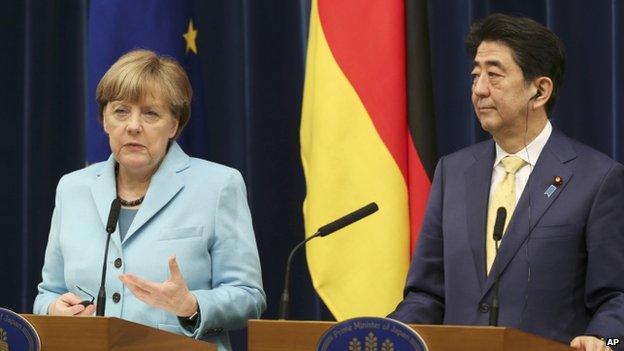China media urge Japan to learn from Merkel's 'history lecture'
- Published

German Chancellor Angela Merkel met Japanese PM Shinzo Abe on Monday
Papers urge Japanese PM Shinzo Abe to learn from German Chancellor Angela Merkel's "history lecture" and "face up" to the country's military past.
During a lecture in Tokyo on Monday, Mrs Merkel said Germany had "faced its past squarely", helping it to move forward.
She said she could not give specific advice on how Japan should deal with the past, but that "history and experience tells us also that peaceful means of reconciliation have to be found".
Japan has been criticised by its neighbours, notably China and South Korea, for what is seen as its inadequate acknowledgement and education of wartime atrocities.
This tension has ramped up in recent years, particularly since Mr Abe took office in 2012.
The China Daily, external reprints a sharply-worded Xinhua commentary, external that criticises the Abe administration's "wishful scheme" for trying to "elevate itself to the rank of Germany on the international stage".
"Tokyo's cowardice is all the more conspicuous against the backdrop of Berlin's sincerity in historical remorse," it says.
'Stubborn' Abe
A front-page commentary in the overseas edition of the People's Daily, external feels that Mr Abe "may not be persuaded by Mrs Merkel".
"It is apparent that Mr Abe resists talking about historical issues," says the commentary.
"Countries including China and South Korea are the victims. It is not that the victims are lacking the heart to forgive and accept, but the victimiser should show sincerity and prove it with actions," urges the article.
Echoing similar sentiments, an opinion piece in the Nanfang Net, external wonders if the "stubborn" Mr Abe will understand "Mrs Merkel's history lesson".
"Mr Abe wants to improve ties with China and hopes to meet the Chinese leaders… His wish has been granted, but the bilateral relationship still has not improved as the problem lies with Mr Abe's reluctance to reflect on historical issues with a correct attitude," says the article.
Mr Abe had met Chinese President Xi Jinping on the sidelines of the Asia Pacific Economic Co-operation meeting held in Beijing last November.
Dalai Lama's successor
Meanwhile, a top Tibetan official has criticised the Dalai Lama's remarks that the Tibetan Buddhism tradition of reincarnation should cease with his death.
The 80-year-old exiled Tibetan spiritual leader had said in an interview last year that he may not have a successor.
Beijing views the Nobel Peace Prize-winner as a "splittist", though he now advocates a "middle way" with China, seeking autonomy but not independence for Tibet.
China has also said repeatedly that it will choose the next Dalai Lama.
According to China News Service, external and the Global Times, external, Padma Choling, chairman of the Standing Committee of the Tibet Autonomous Regional People's Congress, on Monday said that the reincarnation of the Dalai Lama "should follow strict historical conventions and required Tibetan Buddhist religious rituals".
"It's not up to the Dalai Lama… What he said is blasphemy against Tibetan Buddhism," the official reportedly said.
Agreeing with the official's views, Qin Yongzhang, a researcher with the Chinese Academy of Social Sciences, tells the Global Times that the central government "has the authority over the reincarnation system".
"The reincarnation system that has lasted for the past five centuries is never just a religious affair, nor is it a personal affair for the 14th (current) Dalai Lama," notes the pundit.
India's patriarchal society
And finally, some media outlets shine a spotlight on India's "deeply rooted" problems after a controversial BBC documentary on the 2012 gang rape and murder of a female student in Delhi was banned in India.
The 23-year-old student, who died days after the attack in December 2012, was repeatedly beaten and gang-raped while being driven around Delhi in a bus.
The courts have issued an injunction stopping it from being shown in India, and the home minister has promised an inquiry into the making of the documentary.
In the interview, rapist Mukesh Singh, who is facing the death penalty, shows no remorse and suggests the victim might have survived if she had not fought back.
An article in the Global Times, external calls for "a profound reflection" on the rapist's remarks to "truly enhance the respect for women in the patriarchal society".
"Gender inequality and rape is a global challenge, but it turns out to be particularly grave in India," notes the commentary.
BBC Monitoring reports and analyses news from TV, radio, web and print media around the world. You can follow BBC Monitoring on Twitter, external and Facebook, external.